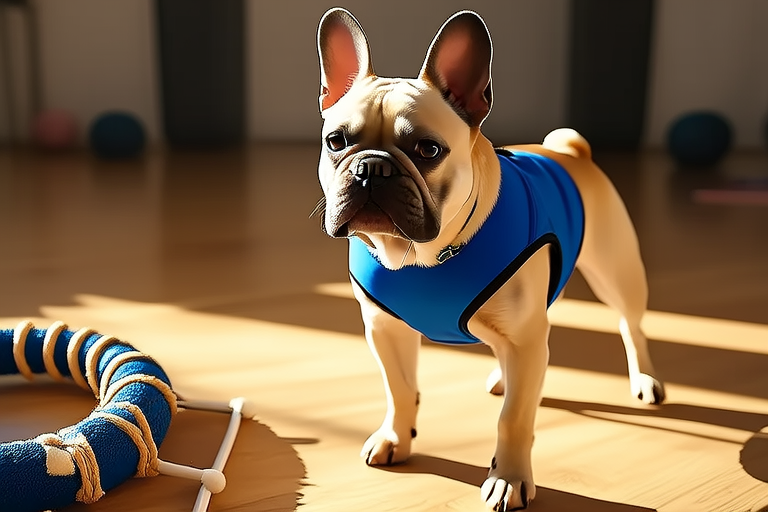The Ultimate Guide to Training Your Frenchie Like a Pro
French Bulldogs, or “Frenchie,” have become one of the most popular dog breeds worldwide due to their unique appearance and charming personalities. However, owning a Frenchie comes with its own set of responsibilities, particularly when it comes to training. This guide will walk you through everything you need to know to train your Frenchie like a pro, from understanding their behavior to addressing common challenges.
Understanding French Bulldog Behavior
Before diving into training techniques, it’s crucial to understand your Frenchie’s behavior. Frenchies are known for their stubbornness, which can sometimes be mistaken for laziness. They are intelligent but can be selective about when they want to engage. Recognizing these traits is key to successful training.
Real-life example: Sarah, a first-time Frenchie owner, found that her dog only responded to commands when she had a treat in hand. Understanding that Frenchies respond well to positive reinforcement helped Sarah adjust her approach, making training sessions more effective.
Essential Training Tips
Training a Frenchie requires patience and consistency. Here are some essential tips to keep in mind:
- Positive Reinforcement: Use treats, praise, and play as rewards for good behavior. This encourages your Frenchie to repeat the desired actions.
- Consistency: Ensure all family members use the same commands and rules. Inconsistency can confuse your dog and make training harder.
- Short Sessions: Keep training sessions short (5-10 minutes) to maintain your Frenchie’s attention span.
- Patience: Be patient and avoid frustration. Training takes time, and every dog learns at their own pace.
These tips will help create a positive learning environment for your Frenchie, making the training process enjoyable for both of you.
Basic Commands
Teaching your Frenchie basic commands is an essential part of their education. Start with simple commands and gradually move on to more complex ones as your dog becomes more comfortable.
- “Sit”: Hold a treat above your Frenchie’s head and say “sit.” As they look up, their bottom should naturally lower. Reward them with the treat and praise.
- “Stay”: Once your Frenchie is sitting, extend your arm in front of them and say “stay.” Take a step back, then return and reward if they remain still.
- “Come”: Call your Frenchie by name followed by “come.” When they approach, reward them with a treat and praise.
- “Leave It”: Place a treat in your closed fist and let your Frenchie smell it. Say “leave it” and wait until they stop trying to get it. Then, open your hand and give them a different treat as a reward.
Practice these commands daily in various environments to ensure your Frenchie understands and responds consistently.
Socialization Techniques
Socializing your Frenchie is vital for their emotional and behavioral development. Proper socialization helps prevent aggression and fearfulness towards other animals and people.
- Expose Early: Introduce your Frenchie to different environments, sounds, and people from an early age.
- Positive Interactions: Ensure these experiences are positive, rewarding your Frenchie for calm behavior around others.
- Controlled Environments: Start with controlled environments where you can manage interactions and gradually increase exposure.
For instance, John took his Frenchie to a local park during off-peak hours to introduce him to other dogs in a safe and controlled setting. This approach allowed his Frenchie to adapt to new situations without overwhelming him.
Common Challenges and Solutions
Training a Frenchie can present several challenges. Here are some common issues and practical solutions:
- Stubbornness: Frenchies can be stubborn, especially when they don’t see the immediate benefit of obeying. To overcome this, make training sessions fun and rewarding, and always end on a positive note.
- Barking: Excessive barking can be frustrating. Teach your Frenchie the “quiet” command by saying “quiet” and rewarding them when they stop barking.
- Chewing: Redirect chewing behavior by providing appropriate chew toys and praising your Frenchie when they choose the right items.
Addressing these challenges requires patience and creativity, but with consistent effort, you’ll see improvements in your Frenchie’s behavior.
Health Considerations Affecting Training
Your Frenchie’s health can significantly impact their ability to learn and follow commands. Conditions such as respiratory issues, hip dysplasia, and allergies can affect their energy levels and overall comfort.
For example, Frenchies with respiratory issues may tire easily during exercise and training. Adjust your training sessions to accommodate your Frenchie’s needs, ensuring they remain comfortable and engaged.
Interactive Games for Engagement
Incorporating interactive games into your training routine can enhance engagement and reinforce learned behaviors. Some fun games include:
- Hide and Seek: Hide treats around the house and encourage your Frenchie to find them.
- Tug of War: Play tug-of-war with a rope toy to strengthen the bond between you and your Frenchie.
- French Bulldog Fetch: While not natural retrievers, some Frenchies enjoy fetch. Use soft, lightweight toys to avoid injuring their delicate bodies.
These games provide mental stimulation and physical activity, promoting a healthier lifestyle for your Frenchie.
Advice from Professional Trainers
Professional trainers offer valuable insights into effective training methods. Here’s what they recommend:
“Consistency is key. Make sure everyone in the household uses the same commands and reinforces the same behaviors. This helps prevent confusion and strengthens the bond between you and your Frenchie.”
– Trainer Emily Johnson
Professional trainers also emphasize the importance of understanding your Frenchie’s individual personality and adapting your training approach accordingly.
Conclusion
Training your Frenchie like a pro requires patience, consistency, and a deep understanding of their behavior. By following the tips and strategies outlined in this guide, you’ll be well-equipped to raise a well-behaved and happy Frenchie. Remember, every dog is unique, so tailor your approach to suit your Frenchie’s specific needs and personality.
